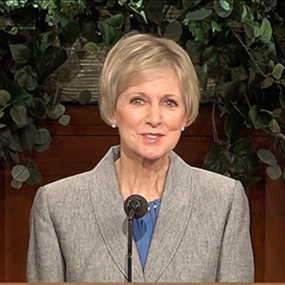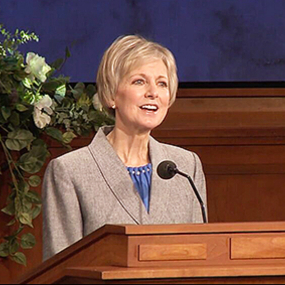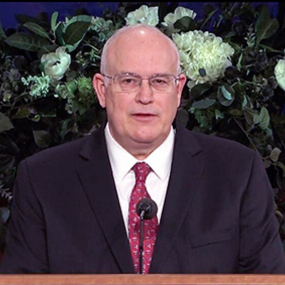This story appears here courtesy of TheChurchNews.com. It is not for use by other media.
Rachel Sterzer Gibson, Church News
When Relief Society General President Jean B. Bingham was a teen on the East Coast, there were only two other members of the Church at her high school, besides her sisters.

Bingham
Relief Society General President Jean B. Bingham speaks to Seminary and Institute instructors during an online training broadcast on Tuesday, January 26, 2021. Image is a screenshot from the broadcast. Image is a screenshot from the broadcast.2021 by Intellectual Reserve, Inc. All rights reserved.It was a time of tumult and divisiveness, with urban unrest and widespread race riots, and wars across the globe, with antiwar protests at home. A lifestyle of “free love” and drug use celebrated individualism and flouted moral norms. Differences of opinion in how government should function separated people into fiercely competing camps.
“Does any of this sound similar to the social environment our youth and young adults are facing today?” President Bingham asked seminary and institute instructors during an online training broadcast on Tuesday, January 26.
Exposed to worldly philosophies, young Jean Bingham began to question the truth of what she had been taught in her home, she said. Fortunately, she had Sister Thomander for a seminary teacher — “a grey-haired, no-nonsense woman with a great breadth of experience in the Church and a deep testimony of the gospel,” President Bingham recalled.
Looking back, President Bingham said she doesn’t remember any games or parties or treats, “but I do remember being spiritually challenged and spiritually uplifted and spiritually fed each day. Every lesson wasn’t fireworks and whistles, but every day was affirming and reassuring as she answered with patience and encouragement the sincere questions that students asked.”
President Bingham used Sister Thomander to illustrate one of two principles she shared during the online training broadcast for seminary and institute instructors across the globe.
Watch Sister Bingham's recorded message.
Elder Paul V. Johnson, a General Authority Seventy and Church Commissioner of Education, and Chad H. Webb, Church administrator of Seminaries and Institutes, also offered remarks.
As an early morning seminary teacher for six years, President Bingham categorized her remarks as “What I wish I knew when I was a seminary teacher.”
The first principle she shared with teachers was to be like Sister Thomander and give students spiritual “meat.”
Youth and young adults today need the spiritual meat of the gospel to answer questions that arise and to help them withstand the pressures that would push them from the covenant path, President Bingham said. “They can handle it. They need it! … We can answer the call: ‘I was an hungred, and ye gave me meat’ (Matthew 25:35).”
In contrast to her experience with Sister Thomander, President Bingham had a seminary teacher who had “a very casual approach.”

Bingham
Relief Society General President Jean B. Bingham speaks to Seminary and Institute instructors during an online training broadcast on Tuesday, January 26, 2021. 2021 by Intellectual Reserve, Inc. All rights reserved.“We learned not to ask doctrinal questions because his answers were often perfunctory or vague, and we weren’t sure he could or would answer them. Seminary served an important social purpose but was not a spiritual experience,” she said.
In Old Testament times, a shofar, or ram’s horn, was used as a trumpet to gather the Lord’s people for worship, to warn or signal instructions, President Bingham explained. “Sister Thomander was that trumpet for me. We must be that trumpet, that trusted voice of assurance of eternal truth in the face of fast-moving, ever-changing world values. We must tell our students the truth and help them understand the ‘why’ as much as the ‘what.’”
President Bingham’s second principle for teachers was to connect with genuine caring. “How do we connect with our students in ways that are appropriate and meaningful?” she asked. There are two international languages understood by all youth and young adults: the language of the Spirit and the language of love.
The first language, that of the Spirit, is recognized by all who seek truth and is communicated heart to heart, President Bingham said.
“As we seek for, listen to and follow the promptings of the Holy Ghost, we will receive inspiration on ways to speak to our students through the Spirit in a manner they understand,” she promised.
The other language that will help instructors connect to students is the language of love. “As teachers, our long-term impact will be directly influenced by the Christlike love we have for our students,” President Bingham said.
As a seminary teacher, President Bingham said one of the greatest blessings for her was being able to study and learn more about the gospel from the materials provided by the Church Educational System. However, the point of that study was to be fully prepared to give students what they needed, not to enthusiastically expound on her personal discoveries.
“You have been and will continue to be blessed by your opportunity to learn and teach the gospel in seminary and institute, but your students will be even more greatly blessed by your focus on their learning rather than on your own,” she said.
President Bingham promised that the Lord will help those striving to juggle the demands of the needs of family, employment or community obligations.
“As you pray, study and act on the promptings you receive, you will be able to give your precious students the meat of the gospel — the spiritual sustenance they need to become the leaders, fathers and mothers they want to and must become in these last days,” she declared.

Bingham
Elder Paul V. Johnson, Commissioner of Education, speaks to Seminary and Institute instructors during an online training broadcast on Tuesday, January 26, 2021. 2021 by Intellectual Reserve, Inc. All rights reserved.A Legacy of Change
In his remarks to seminary and institute instructors, Elder Johnson spoke of the legacy of change found within the Church Educational System by matching up the history of Church education with his own family history.
For example, Sarah Jane Angell, his great-great-grandmother, was a young girl when her family lived in Kirtland, Ohio; Missouri and Nauvoo, Illinois. She arrived in the Salt Lake Valley in 1848, as a 14-year-old girl, and received schooling in whatever community schools they had in those locations.
His grandfather Alphalus attended Brigham Young College in Logan, Utah, and met Elder Johnson’s grandmother there. In 1926, the Institute of Religion program began in Moscow, Idaho; by 1928, the second institute was established in Logan, Utah. Elder Johnson’s parents first met at an activity at the Logan Institute.
Elder Johnson met his wife, Sister Jill Johnson, in a seminary class in Monticello, Utah. On his mission to Norway, he helped a young man with his home-study seminary lessons as seminary and institute expanded to different parts of the world. Elder Johnson’s children attended seminary in release-time programs, and now his grandchildren are seminary-age and institute-age.
Acknowledging some of the recent changes to seminaries and institutes, such as aligning curriculum with “Come, Follow Me” and learning to deliver class remotely during the pandemic, Elder Johnson assured his listeners, “I am cheering for all of you as we make changes that will be suited ‘to the conditions of the’ rising generation. I cheer extra loudly because that rising generation includes our grandchildren.”
Elder Johnson shared the example of President Russell M. Nelson, who helped to open the countries in Eastern Europe for the preaching of the gospel. When asked about the stops and starts, failures and ups and downs in that process, then-Elder Nelson replied, “The Lord likes effort. … Are you willing to do really hard things? Once you’ve shown you’re willing to do your part, He will help you.”
“Miracles take hard work,” Elder Johnson said. “The miracles we long for will take tremendous effort on our part.”
Despite changes, the objectivesof Seminaries and Institutes are clear and have not changed, he said. “We still strive to bless these young people and help them ‘understand and rely on the teachings and Atonement of Jesus Christ, qualify for the blessings of the temple, and prepare themselves, their families, and others for eternal life with their Father in Heaven.’”
Watch Elder Johnson's recorded message.
Copyright 2020 Deseret News Publishing Company
